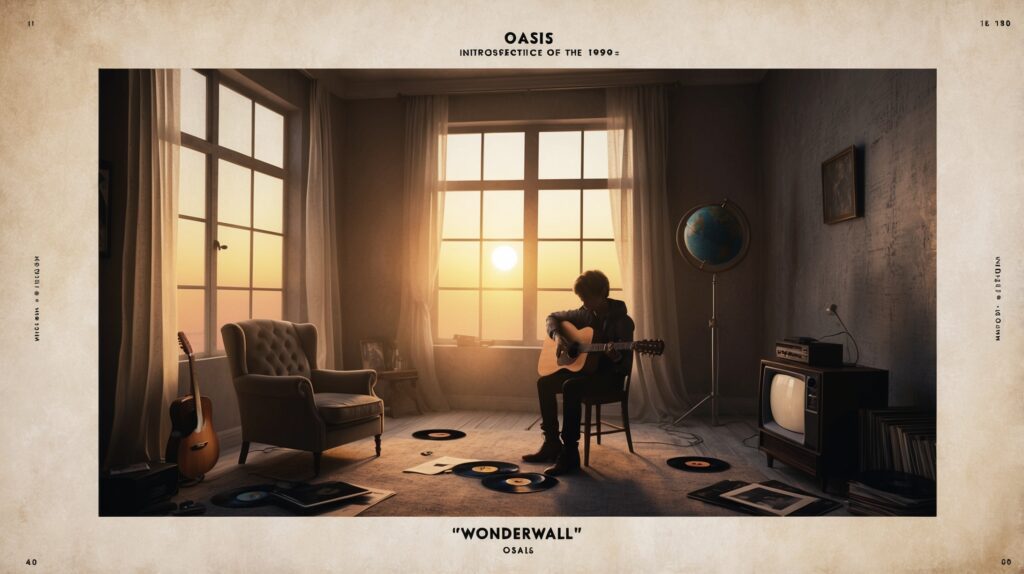? Did you know #NineInchNails’ “Terrible Lie” was a last-minute addition to their debut album? ? Trent Reznor’s raw emotion makes it an absolute gem! ? Turn it up! ? #TerribleLie #FunFact #MusicLovers Read about it: tinyurl.com/bdd3hv29
Unearthing the Depths of Nine Inch Nails’ Angst
Diving into the raw, emotional core of NIN’s “Terrible Lie,” as Reznor’s unflinching honesty continues to shape the band’s enduring impact on alternative music.

Industrial rock pioneers Nine Inch Nails (NIN), led by the enigmatic Trent Reznor, have cemented their status as one of the most influential bands of the past few decades. With a career spanning over 30 years, NIN has explored various sonic landscapes from the aggressive sounds of industrial rock to ambient, electronic, and experimental music. Among their vast discography, the song “Terrible Lie” from their debut album “Pretty Hate Machine” (1989) is an exemplary track that showcases the band’s penchant for raw, emotional expression.
“Terrible Lie” is an emotional outpouring of Reznor’s feelings of betrayal and disillusionment, which resonates with NIN’s fan base due to its relatable themes of anger and angst. The song seamlessly combines synthesized beats, distorted guitars, and Reznor’s signature howls to create a sense of urgency and tension. The lyrics are introspective, as Reznor vents his frustrations to a higher power, reflecting his struggle with religion and faith. This introspection laid the groundwork for future Nine Inch Nails releases, with Reznor’s unflinching honesty becoming a trademark of the band’s output.
Throughout their career, Nine Inch Nails have seen various members come and go, with Trent Reznor remaining the sole constant – writing, producing, and performing the majority of the music. Key collaborators have included Richard Patrick, Danny Lohner, Robin Finck, and Atticus Ross, the latter of whom has played an increasingly prominent role in recent years, eventually being credited as an official member of the band in 2016.
Nine Inch Nails’ contributions to the music world have not gone unnoticed. They have been nominated for 13 Grammy Awards, with wins for “Best Metal Performance” in 1993 for the song “Wish” and in 1996 for the song “Happiness in Slavery.” In addition, Reznor and Ross have received critical acclaim for their work in film scoring, earning an Academy Award for Best Original Score for “The Social Network” (2010) and “Soul” (2020).
Despite their success, one cannot ignore the occasional critiques aimed at the band’s repetitive themes of pain, anger, and nihilism. Some argue that this has led to a sense of stagnation in their later releases. However, it’s undeniable that Nine Inch Nails have left an indelible mark on the music industry, influencing countless artists across genres and continuously pushing the boundaries of sound and expression. “Terrible Lie,” with its unapologetic exploration of anguish and betrayal, remains a cornerstone of the band’s legacy and a testament to their enduring impact on the world of alternative music.
Charting the Course of “Terrible Lie”
“Terrible Lie”: The unsung hero of Nine Inch Nails’ debut, fueling fan devotion & chart success despite its single status.

Despite not being released as a single, “Terrible Lie” has earned a spot in the hearts of Nine Inch Nails fans and managed to leave its mark on the music scene. The song made its grand arrival on the band’s debut album, “Pretty Hate Machine,” which was released on October 20, 1989.
Although “Terrible Lie” didn’t initially chart, it became a fan favorite and a regular staple of Nine Inch Nails live performances. As a result, it garnered enough attention and popularity to be included on several compilation albums and live recordings. One such example is the 2002 compilation album, “And All That Could Have Been,” which features a live version of the song. This live rendition showcases the raw essence and energy of Nine Inch Nails’ stage presence, further solidifying its significance in their discography.
It’s worth noting that “Pretty Hate Machine,” the album that introduced “Terrible Lie” to the world, had an impressive chart run itself. The album peaked at No. 75 on the Billboard 200 chart and eventually went on to achieve triple-platinum status in the United States, selling over three million copies. This achievement is a testament to the enduring appeal of the band’s early material, including “Terrible Lie.”
Furthermore, “Terrible Lie” has had some impact on the band’s chart success in other ways. For example, the song was featured on a 2010 reissue of “Pretty Hate Machine,” which was remastered and included a cover of Queen’s “Get Down, Make Love” as a bonus track. This reissue helped the album re-enter the Billboard 200 chart, peaking at No. 106.
In conclusion, while “Terrible Lie” might not have the chart numbers to back its individual success, its presence in the Nine Inch Nails catalog and its inclusion in live performances and compilations have cemented its place in the band’s history. Its role in contributing to the overall success of “Pretty Hate Machine” highlights its importance as a standout track and fan favorite in the world of alternative music.
Diving into the Lyrics of an Industrial Masterpiece
Am I not living up to what I’m supposed to be?
Why am I seething with this animosity?
Hey god, I think you owe me a great big apology.
(Chorus)
Terrible lie
Terrible lie
Terrible lie
Terrible lie
Hey god, I really don’t know what you mean.
Seems like salvation comes only in our dreams.
I feel my hatred grow all the more extreme.
Hey god, can this world really be as sad as it seems?
(Chorus)
Don’t take it away from me.
I need you to hold on to.
Don’t take it away from me.
I need you to hold on to.
Don’t take it away from me.
I need someone to hold on to.
Don’t take it away from me.
I need you to hold on to.
There’s nothing left for me to hide.
I lost my ignorance, security and pride.
I’m all alone in a world you must despise.
Hey god, I believed your promises, your promises and lies.
(Chorus)
You made me throw it all away.
My morals left to decay.
How many you betray.
You’ve taken everything.
Terrible lie.
My head is filled with disease.
My skin is begging you please.
I’m on my hands and knees.
I want so much to believe.
The lyrics of “Terrible Lie” by Nine Inch Nails expose a profound sense of disillusionment and anger towards God and the world in general. Lead singer and songwriter, Trent Reznor, uses piercing and brutally honest language to express his frustration with the expectations and promises made in religious beliefs, which he feels have failed him.
Written during a tumultuous period in the late 1980s and early 1990s, these lyrics can be seen as a reflection on the social and political issues of the time. The economic downturn, AIDS epidemic, growing drug abuse, and increasing skepticism towards authority figures and institutions may have contributed to the song’s themes of betrayal, mistrust, and the search for meaning in a seemingly bleak world.
In the chorus, the repetitive use of the phrase “Terrible lie” emphasizes the feeling of being deceived and let down by the very foundation of one’s belief system. The song’s protagonist pleads with God, questioning the existence of salvation and the true nature of the world. With powerful imagery, such as “my skin is begging” and “I’m on my hands and knees,” Reznor portrays the desperation and vulnerability that come with confronting these existential questions.
In essence, the lyrics of “Terrible Lie” resonate with listeners who may be grappling with their own struggles and disillusionments, making it not only an industrial rock classic but also an anthem of the struggle to find truth and meaning in a complex and often unforgiving world.
Unraveling the Intricacies of the “Terrible Lie” Visuals
Dive into Nine Inch Nails’ raw intensity with the iconic “Terrible Lie” live visuals, mirroring the emotional turmoil of deception through immersive stage design and fan tributes.
The music video for “Terrible Lie,” one of Nine Inch Nails’ standout tracks from their debut album “Pretty Hate Machine,” does not have an official music video per se. However, the song is accompanied by a series of live performance videos that showcase the intensity and raw emotion of Trent Reznor and the band in action. The most popular and widely recognized version is from the 1994-1995 “Self Destruct” tour, which features footage from the legendary Woodstock ’94 performance.
This powerful performance has been captured in the concert film “Closure,” released in 1997. The film, directed by Jonathan Rach and Peter Christopherson, delves deep into the world of Nine Inch Nails, featuring live footage, backstage antics, and interviews, and offers an intimate look at the band during their most tumultuous and creative period. The “Terrible Lie” performance, in particular, showcases Trent Reznor’s visceral connection with the song’s dark and haunting lyrics, as the band delivers a ferocious rendition that leaves a lasting impression.
The live performance of “Terrible Lie” is also notable for its unique stage production and visuals. The band’s innovative use of lighting, projection, and stage design creates an immersive experience that truly brings the audience into Nine Inch Nails’ world. The juxtaposition of stark, monochromatic visuals with bursts of vibrant color perfectly complements the song’s themes of deceit, betrayal, and existential anguish. As Trent Reznor pours his heart and soul into the performance, the captivating visuals amplify the emotional weight of the song.
Fans of Nine Inch Nails have also created their own unofficial music videos for “Terrible Lie,” showcasing their love for the song and the band. These fan-made videos often incorporate footage from live performances, interviews, and other media, creating a unique and personal tribute to the track. A number of these fan videos can be found on YouTube, where the community of Nine Inch Nails enthusiasts continues to grow and thrive.
While there might not be a traditional, official music video for “Terrible Lie,” the stunning live performances and fan tributes that have been shared throughout the years offer a powerful and immersive way to experience the song. With its evocative imagery and unforgettable performances, “Terrible Lie” remains a definitive and enduring part of Nine Inch Nails’ storied history.
The Mastermind Behind “Terrible Lie”
Trent Reznor, the genius composer and founder of the industrial rock project Nine Inch Nails, is the mastermind behind the powerful and anguished track “Terrible Lie.” This multi-talented musician, singer, and producer has been the driving force behind Nine Inch Nails since its inception in 1988, showcasing his incredible gift for blending dark, atmospheric soundscapes with poignant and raw lyrics. Reznor has a long list of notable compositions under his belt, with some of the most iconic tracks being “Closer,” “Hurt,” “Head Like a Hole,” and “The Hand That Feeds.” In addition to his work with Nine Inch Nails, Reznor has also earned acclaim for his collaborations with Atticus Ross on various film scores, such as “The Social Network,” “The Girl with the Dragon Tattoo,” and “Gone Girl,” further cementing his status as a versatile and prolific composer in the world of music.
Awards, Accolades, and Appearances
“Terrible Lie” – a timeless fan favorite from Nine Inch Nails’ triple-platinum debut album, Pretty Hate Machine, that continues to influence and inspire artists with its unique blend of industrial rock and introspective lyrics.

“Terrible Lie” has garnered significant appreciation and acclaim since its release in 1989 as part of Nine Inch Nails’ debut album, Pretty Hate Machine. Although the song itself didn’t earn any specific awards or accolades, its parent album, Pretty Hate Machine, received several recognitions. The album was certified triple-platinum by the RIAA, and Rolling Stone ranked it at #94 in their list of “The 100 Greatest Albums of the 1980s”. The song remains a fan favorite that showcases Trent Reznor’s unique blend of industrial rock and dark, introspective lyrics.
As for its appearances in popular culture, “Terrible Lie” has not been prominently featured in movies, TV shows, or video games. However, its immersive sonic landscape and powerful lyrics make it a quintessential Nine Inch Nails track that has been performed live by the band countless times, particularly during their early years.
There have been a number of cover versions of “Terrible Lie” produced over the years, showcasing the song’s lasting appeal and influence on various artists. One notable cover was recorded by alternative rock band AFI for their 2006 EP, AFI/Key Lime Pie, which featured AFI’s rendition of the song as a B-side. The cover gives a fresh, punk-infused twist to the original track while still maintaining its emotional intensity. Another notable cover was created by electronic musician TweakerRay, who reinvented “Terrible Lie” as a brooding electronic soundscape with glitchy beats and haunting piano melodies.
Overall, “Terrible Lie” may not have received any specific awards or accolades, but its presence in Nine Inch Nails’ iconic discography has undoubtedly made a lasting impact in the world of alternative and industrial music. From its influences on other artists to the numerous cover versions and fan devotion, “Terrible Lie” has undoubtedly stood the test of time as an emblematic piece of Nine Inch Nails’ legacy.
Diving into the Musical Depths
Delving into the musical aspects of “Terrible Lie,” one can appreciate the intricate composition and thought process behind this iconic track. Written in the key of D minor, the song is in a 4/4 time signature and maintains a tempo of 94 beats per minute. The haunting, atmospheric introduction sets the stage for the song’s dark narrative, which is mirrored throughout the song’s structure.
The opening synth line is built around a simple yet powerful three-note sequence (D, C, and A), which is repeated with slight embellishments throughout the song. This creates a sense of tension and unease that aligns perfectly with the lyrical content. The synth line is then complemented by the introduction of the guitar, which strums a series of power chords that accentuate the minor tonality and further establish the song’s ominous mood.
As we progress into the verse, the drums and bass enter the mix, solidifying the groove and driving the song forward. The bassline is rooted in the key of D minor, with some syncopated rhythms that add complexity to the song’s overall structure. The verse follows a chord progression of Dm – C – Bb – A, which then transitions into the pre-chorus, where the progression shifts to F – C – Dm – A. This movement between chords adds to the song’s already rich atmosphere and keeps the listener engaged.
The chorus is where the song’s intensity truly peaks, with the guitar riff taking center stage. The chord progression, while still grounded in D minor, becomes more aggressive and dissonant, reflecting the raw emotion conveyed through the lyrics. The heavy use of distortion and effects on the guitar also adds a layer of grit and intensity to the mix, further amplifying the song’s impact.
In the latter half of the song, an instrumental bridge showcases the band’s ability to create captivating sonic landscapes, utilizing a combination of dynamic shifts and intricate layering of synths and guitars. This section provides a brief respite from the relentless energy of the track before launching back into the final chorus, culminating in a powerful and cathartic conclusion.
Throughout “Terrible Lie,” Nine Inch Nails demonstrates a mastery of musical composition, combining carefully crafted melodies, harmonies, and rhythms to create an unforgettable listening experience. The attention to detail within the song’s structure allows for a deep exploration of the track’s themes and emotions, making it a standout piece in the band’s extensive catalog.







